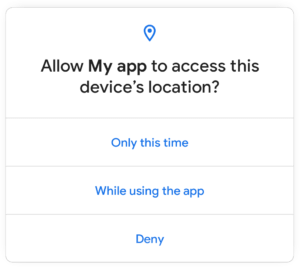I’ve only just upgraded my Xiaomi Mi A2 phone to Android 10 earlier this week, but Google is already preparing for the next version of the mobile operating system, and the company has already released the first developer preview for Android 11 OS.
Enhancements for foldables and 5G, call-screening APIs, new media & camera capabilities, and machine learning are some of the improvements brought to Android 11 so far.
Some of Android 11 highlights include:
- Updates of existing connectivity APIs to take advantage of improved 5G speeds.
- Dynamic meteredness API to check whether the connection is unmetered in order to offer higher resolution or quality for users who don’t need to pay extra for data
- Bandwidth estimator API to check the downstream/upstream bandwidth without having to poll the network.
- Pinhole and waterfall screen support – Pinhole screens are the ones with a round opening for the camera, and waterfall screens are displays that are curved on the edges. Android 11 includes a new API designed to use the entire waterfall screens including the edges, with insets to manage interaction near the edges.
- Messaging
- Dedicated conversations section in the notification shade
- Bubbles are a way to keep conversations in view and accessible while multi-tasking on their phones
- Insert images into notification replies
- Neural Networks API 1.3 – Adds Quality of Service APIs,
Memory Domain APIs to reduce memory copying and transformation for consecutive model execution, and expanded quantization support (signed integer asymmetric quantization) - Privacy

- One-time permission – Users can now grant temporary access through a one-time permission
- Scoped storage – Improvements such as opt-in raw file path access for media, updated DocumentsUI, and batch edit operations in MediaStore.
- Security
- Biometrics – BiometricPrompt now supports three authenticator types with different levels of granularity — strong, weak, and device credential.
- Platform hardening – Use of compiler-based sanitizers in security-critical components, including BoundSan, IntSan, CFI, and Shadow-Call Stack. Heap pointer tagging has also been enabled for apps targeting Android 11 or higher to help apps catch memory issues in production.
- Secure storage and sharing of data – Apps can now share data blobs through a BlobstoreManager.
- Identity credentials – Android 11 adds platform support for secure storage of identification documents such as ISO 18013-5 compliant Mobile Driving Licenses.
- Image and camera improvements
- HEIF animated drawables – Android 11 now supports animated HEIF files which should be much more compact than animated GIFs.
- Native image decoder – New NDK APIs let apps decode and encode images (such as JPEG, PNG, WebP) from native code for graphics or post-processing
- Muting during camera capture – Vibration from ringtones, alarms or notifications can be muted while the camera is active.
- Bokeh modes – Apps can use metadata tags to enable bokeh modes on camera capture requests.
- Lower latency for video decoding in MediaCodec and HDMI low-latency mode support both useful for gaming.
The first Android 11 developer preview is only available for Pixel 2/2 XL, Pixel 3/3 XL, Pixel 3a/3a XL, and Pixel 4/4 XL devices, and you can download the firmware images on Android developer website. Alternatively, it’s also possible to run Android 11 in the Android Emulator found in Android Studio, and Google also released GSI images that could be tried on Treble-compliant devices.

Jean-Luc started CNX Software in 2010 as a part-time endeavor, before quitting his job as a software engineering manager, and starting to write daily news, and reviews full time later in 2011.
Support CNX Software! Donate via cryptocurrencies, become a Patron on Patreon, or purchase goods on Amazon or Aliexpress






